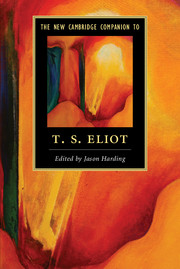Book contents
- Frontmatter
- Contents
- Notes on contributors
- Preface
- Chronology of Eliot's life and works
- List of abbreviations
- 1 Unravelling Eliot
- 2 Eliot: Form and Allusion
- 3 Prufrock and Other Observations
- 4 Banishing the Backward Devils: Eliot's Quatrain Poems and “Gerontion”
- 5 With Automatic Hand: The Waste Land
- 6 “Let These Words Answer”: Ash-Wednesday and the Ariel Poems
- 7 Four Quartets
- 8 “A Precise Way of Thinking and Feeling”: Eliot and Verse Drama 116
- 9 T. S. Eliot as Literary Critic
- 10 T. S. Eliot's Social Criticism
- 11 Gender and Sexuality
- 12 Eliot's Philosophical Studies: Bergson, Frazer, Bradley
- 13 “Anglo-Catholic in Religion”: T. S. Eliot and Christianity
- Select bibliography
- Index
- Miscellaneous Endmatter
12 - Eliot's Philosophical Studies: Bergson, Frazer, Bradley
Published online by Cambridge University Press: 01 December 2016
- Frontmatter
- Contents
- Notes on contributors
- Preface
- Chronology of Eliot's life and works
- List of abbreviations
- 1 Unravelling Eliot
- 2 Eliot: Form and Allusion
- 3 Prufrock and Other Observations
- 4 Banishing the Backward Devils: Eliot's Quatrain Poems and “Gerontion”
- 5 With Automatic Hand: The Waste Land
- 6 “Let These Words Answer”: Ash-Wednesday and the Ariel Poems
- 7 Four Quartets
- 8 “A Precise Way of Thinking and Feeling”: Eliot and Verse Drama 116
- 9 T. S. Eliot as Literary Critic
- 10 T. S. Eliot's Social Criticism
- 11 Gender and Sexuality
- 12 Eliot's Philosophical Studies: Bergson, Frazer, Bradley
- 13 “Anglo-Catholic in Religion”: T. S. Eliot and Christianity
- Select bibliography
- Index
- Miscellaneous Endmatter
Summary
In July 1922, as part of an attempt to assemble a list of distinguished writers for the Criterion, Eliot contacted E. R. Curtius, professor at the University of Marburg, to express admiration for his recent book, Die literarischen Wegbereiter des neuen Frankreich (1919) [Literary Precursors of the New France] (L1 694). When Curtius responded positively, Eliot expressed “the hope that we may some day see a work from you on English literature comparable to your book on contemporary France” (L1 721). In August 1923, Eliot repeated his suggestion: “I wish you wd do a series of English Wegbereiter,” adding that “my choice” would include Henry James, Joseph Conrad, and Rudyard Kipling, and “I shd be tempted to add Frazer and Bradley” (L2 186). Curtius did not write such a book, but two months later, in October 1923, Eliot finished an essay for Vanity Fair making his own case for James, Frazer, and Bradley as precursors: “A Prediction in Regard to Three English Authors: Writers Who, Though Masters of Thought, are Likewise Masters of Art.” He claimed that these writers had shaped the sensibility of a generation and predicted that they would endure because their work, compared to that of their contemporaries, “throbb[ed] at a higher rate of vibration with the agony of spiritual life” (CP2 517). Of the three “masters,” only James, strictly speaking, is a “literary” precursor; Frazer is a social scientist and Bradley a philosopher. The author of The Golden Bough undoubtedly influenced the sensibility of a generation, but the author of Principles of Logic and Appearance and Reality was relatively obscure, known primarily to students and fellow philosophers. Frazer and Bradley made Eliot's list in large part because they were his own precursors, touchstones in his intellectual biography. With James, they represent the three core areas of his university education: literature, social science, and philosophy.
Eliot was educated, chiefly at Harvard, between 1906 and 1916. In June 1910, he received his B.A, and in October, he crossed the Atlantic to attend the lectures of Henri Bergson. At the end of his year in Paris, he returned to Harvard to work on a Ph.D. in philosophy, in the course of which Frazer and Bradley joined Bergson as major influences.
- Type
- Chapter
- Information
- The New Cambridge Companion to T. S. Eliot , pp. 175 - 186Publisher: Cambridge University PressPrint publication year: 2016

